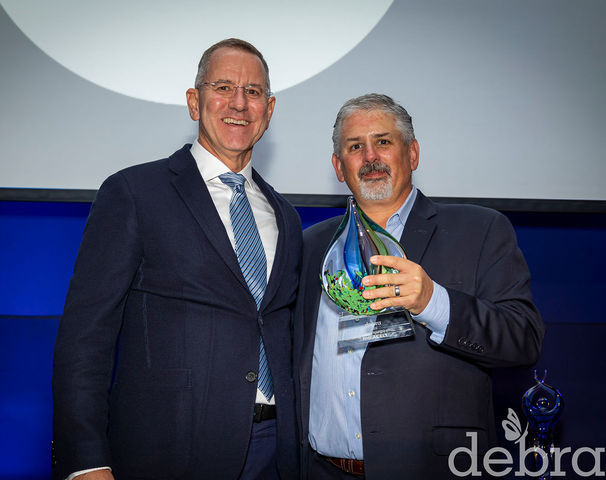Stem cell therapy for "Butterfly disease" / RHEACELL receives 'Partners in Progress Award' from debra of America for Epidermolysis Bullosa research
November 09, 2022 (PRLEAP.COM) Business News
Heidelberg, November 9, 2022. The biopharmaceutical company RHEACELL, which specializes in stem cells, was honored on October 24 by the organization 'Dystrophic Epidermolysis Bullosa Research Association of America' (debra) with the 'Partners in Progress Award'. The award, presented at the annual 'debra Benefit' charity event in Atlanta, recognizes RHEACELL's research commitment and medical advancements in the development of a therapy for the treatment of severe forms of Epidermolysis Bullosa (EB). So far, there is no approved causal therapy for EB, a rare genetic skin disease in which the skin is as fragile as the wings of a butterfly. Hopes now rest on the application of ABCB5+ mesenchymal stromal cells, which have shown promising results in ongoing clinical trials.Standing shoulder to shoulder for "the worst disease you've never heard of"
The non-profit organization debra of America describes Epidermolysis bullosa (EB) as "the worst disease you've never heard of", as it is one of the rare diseases with around 500,000 people worldwide[1], which massively harms the quality of life of those affected. EB, also known as 'butterfly disease', encompasses a heterogeneous spectrum of genetic skin diseases in which the skin is so fragile that even minor mechanical stress or friction can lead to blistering with painful chronic wounds to the skin and mucosa.[2] EB is a systemic multi-organ disease. Thus, in more severe forms inflammation or severe scarring is also possible on internal organs such as the gastrointestinal tract.[3] Erosion and scarring of the esophagus can make it difficult or even impossible for patients to swallow solid food, resulting in malnutrition and growth restriction. In addition, the loss of finger- or toenails and the merging of fingers and toes can lead to considerable functional disorders and thus to a severe disability.
Hope begins with research
Debrais committed to supporting medical care for those affected and promoting innovative research to develop effective treatments for EB.With this year's 'Partners in Progress Award', debra recognizes RHEACELL's research commitment and the further development of its innovative approach of ABCB5+ mesenchymal stem cells for EB. RHEACELL specializes in stem cell therapies for patients suffering from severe inflammation-driven diseases with high unmet medical need. Founded in 2012, RHEACELL's declared goal is to help patients like those suffering of EB who would have no other therapy options.
Statements:
"We are very pleased about this award from debra. It further spurs us on to push ahead our research and clinical development program in order to be able to give people with EB new hope," says Dr. Christoph Ganss, physician, co-founder and managing director of RHEACELL. (Picture on demand).
"I am so honored to work with companies like RHEACELL who focus their efforts on rare diseases and EB in particular. Working with innovative companies that are developing potential therapeutic options to treat and hopefully one day cure my daughter's severe form of EB, and to make sure all like her have access to innovative treatment options, is what we at debraof America are passionate about every day. RHEACELL's therapeutic approach to deliver stem cells systemically differentiates them from others who center on localized therapy. I am very hopeful about their progress in developing a stem cell therapy for EB. In fact, I am quite enthused by their holistic approach to treatment for those with EB and rare diseases in general. It was an honor for me to present Christoph Ganss with the 2022 'Partners in Progress Award'", explained Brett Kopelan, Executive Director of debra of America at the 'Partners in Progress Award' ceremony.
More information and pictures of the 'Partner in Progress Award' on demand.
[1] Rashidghamat, E. et al. (2017). Intractable & Rare Diseases Research. 2017; 6(1):6-20. DOI: 10.5582/irdr.2017.01005.
[2] Nauroy P. et al. (2021). JDDG. 2021; 1610-0379/2021/1906, DOI: 10.1111/ddg.14396_g.
[3] Kiritsi D. et al. (2021). JCI Insight. 2021;6(22):e151922. DOI: ttps://doi.org/10.1172/jci.insight.151922.
